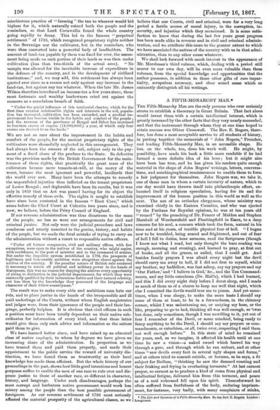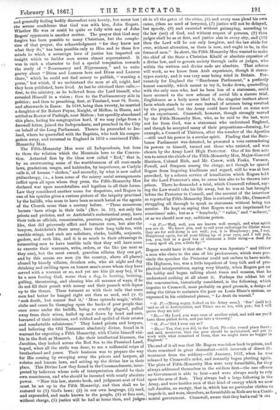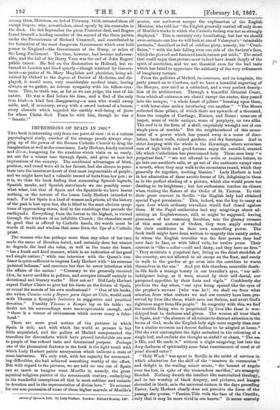A FIFTH-MONARCHY MAN * THE Fifth-Monarchy Men are the only
persons who ever seriously strove to establish a theocracy in Great Britain. That fact alone would invest them with a certain intellectual interest, which is greatly increased by the other facts that they very nearly succeeded, and that the instrument through whom they at one time hoped to attain success was Oliver Cromwell. The Rev. E. Rogers, there- fore, has done a most acceptable service to all students of history-, in putting together the memorials of " John Rogers," Preacher, and leading Fifth-Monarchy Man, in an accessible shape. He has, on the whole, too, done his work well. He might, by possibility, have made his book a little more readable if he had formed a more definite idea of his hero ; but it might also have been less true, and he has given his readers quite enough material in the shape of John Rogers' writings, letters, conversa- tions, and autobiographical reminiscences to enable them to form a fair judgment for themselves. John Rogers was, we take it, one of those men in whom a certain intensity of nature, which in our day would have thrown itself into philanthropic effort, ex- hausted itself in religious speculation, having for its end the improvement of the human position iu this world as well as the next. The son of an orthodox clergyman, whose ministry was exercised chiefly in the Eastern Counties, and who was ejected by the Puritans for Royalist opinions, he was at ten years old " roused" by the preaching of Dr. Fenner of Maldon and Stephen Marshall of Weathersfield and Finchingfield in Essex, to a deep concern for his soul, a concern which took the form, natural in his time and at his years, of terrible physical fear of hell. "I began now to be troubled, being scared and frightened, and out of fear of hell I fell to duties, hear sermons, read the Scriptures (though I know not what I read, but only thought the bare reading was enough, morning and evening), and learned to pray, at first out of books, and all the graces, so called, that I could get. And besides family prayers I was afraid every night lest the devil should carry me away to hell, if I did not first to myself, whilst my brother, my bedfellow, was fast asleep, say my prayers and my Our Father,' and ' I believe in God,' &c., and the Ten Command- ments, and my little catechism (Dr. Hall's), which I had learned, and this I did every night duly before I durst sleep, and I made as much of them as of a charm to keep me well that night, which else I conceited the devils would tear me to pieces. And yet some- times, when I was sleepy, to make the more baste I should say some of them at least, to be in a forwardness, in the chimney corner, whilst I was unbuttoning me, or untying my hose, or the like, preparing to go to bed, thinking all was well enough, so 'twas but done, only sometimes, though I was unwilling to it, yet out of fear I remember of the Devil, or some mischief, being ready to fancy anything to be the Devil, I should say my prayers or com- mandments, or catechism, or all, twice over, suspecting I said them not well enough before." In this state of mind he remained for years, and, as we imagine, it affected his health until at one time he saw a vision—a naked sword which barred his way through a gate, and through which he ran unhurt, and at other times "saw devils every foot in several ugly shapes and forms," and at others tried to commit suicide, or became, as he says, a fit subject for Bedlam, "thinking he saw the damned roasting and their frisking and frying in everlasting torments." At last earnest prayer, so earnest as to produce a kind of coma from physical and intellectual fatigue, delivered him from this torment, and peace as of a soul redeemed fell upon his spirit. Thenceforward he often suffered from fretfulness of the body, enduring imprison- ment, for instance, very badly, with many complaints of stinks, • ma Life and Opinions of a Fifih-Monarchy Man. By the Rev. E. Rogers. London : Louginsus. and generally feeling bodily discomfort very keenly, but never lost the serene confidence that God was with him, John Rogers. Whether He was or could be quite so fully with any of John Rogers' opponents is another matter. The prayer that God may forgive has been possible to many Christians, but the comple- tion of that prayer, the acknowledgment " for they know not what they do," has been possible only to Him and to those few minds to which a sovereign love of justice has imparted an insight which to feebler men seems almost supernatural. It was in such a character to feel a special temptation towards the study of " Necromancy and Nigromancy," and to write poetry about " Dives and Lazarus here and Dives and Lazarus there," which he could not find money to publish, "wanting a purse," but which, if we understand the man at all, might, had they been published, have lived. At last he obtained three calls,— first, to the ministry, as he believed from the Lord himself, who revealed Himself in a vision ; then to the Parliamentary side in politics ; and then to preaching, first, at Toseland, near St. Neots, and afterwards in Essex. In 1648, being then twenty, he married a daughter of Sir Robert Payne, Knight, of Midloe, in Hants, and settled as Rector of Purleigh, near Mahon ; but speedily abandoned this place, hating his congregation hard, if we may judge from a farewell letter, joined the Independents, and preached in the City on behalf of the Long Parliament. Thence he proceeded to Ire- land, where he quarrelled with the Baptists, who took his congre- gation away, and returned to England in 1652 a convinced Fifth- Monarchy Man.
The Fifth-Monarchy Men were all Independents, but bore to them the relation which the Mountain bore to the Conven- tion. Actuated first by the ideas now called " Red," that is, by an overweening sense of the worthlessness of all man-made laws, gradations, usages, and habitudes, by impatience, as Carlyle calls it, of human " clothes," and secondly, by what is now called philanthropy, i.e., a keen sense of the misery social arrangements inflict upon all upon whom they press, the Fifth-Monarchy Men declared war upon sacerdotalism and legalism in all their forms. Law they considered another name for despotism, and Rogers in one of his epistles gives a curious picture of the iniquity practised by the bailiffs, who seem to have been as much hated as the agents of the Church more than a century before. "These monstrous locusts ' have stings in their tails' (Rev. ix. 10), not only the priests and prelates, and so Antichrist's ecclesiastical army, have their tails as officials, commissaries, proctors, registrars, and such like, that did grievously afflict and torment men, but also the lawyers, Antichrist's State army, have their long tails too, with terrible stings, and such are solicitors, clerks, bailiffs, serjeants, gaolers, and such like, and it is so much to their advantage in tormenting men to have terrible tails that they will have none to execute their warrants, writs, orders, or the like (as near as they can), but the most cursed, graceless villains they can get, and by this means are men (in the country, above all places) abused by bloody villains, drunken sots, who sit night and day drinking and swilling upon an honest man's score whom they have served with a warrant or so, and yet use him (it may be), if he be a man fearing God, worse than a dog, in beating, bruising, pulling, threatening, and abusing him all manner of ways, if he do not fill their pouch with money and their paunch with liquor up to the throat. These torment so with their tails that some men had better be hanged right out than so used, and (v. 6) 4 seek death, but cannot find it,' Mors optanda magis,' whiles clubs and canes lie thumping upon the backs of poor people that once come under the bailiffs, being so cruelly plagued, pulled away from their wives, hailed up and down by head and ears, bereaved of their relations, and robbed and spoiled of their estates and comfortable subsistence." They hated priests and lawyers, and believing the Old Testament absolutely divine, found in it warrant for expecting a Fifth Monarchy, with Christ himself visi- ble in the flesh as Monarch. Like their intellectual kinsmen, the Jacobins, they looked across the Red Sea to the Promised Land, hoped, when all the strife was done, to see a millennial reign of brotherhood and peace. Their business was to prepare the way for His coming by sweeping away the priests and lawyers, all rubrics and human, laws, and setting up the divine law in their place. This Divine Law they found in the Commandments, inter- preted by believers whose code of interpretation should be their own consciences, and who should be invested with nearly absolute power. "Now this law, statute-book, and judgment-seat of God must be set up in the Fifth Monarchy, and then shall we be restored to (1) God's laws; (2) in our own language, (3) read, and expounded, and made known to the people, (4) at free cost, without charge, (5) justice will be had at home then, and judges
sit in all the gates of the cities, (6) and every man plead his own cause, (then no need of lawyers), (7) justice will not be delayed, but speedy, (8) and executed without gainsaying, according to the law (set) of God, and without respect of persons, (9) then judges shall be as at first, and justice also in every city, and (10) then the Lord will be our only lawgiver, and the law abide for ever, without alteration, as there is now, and ought to be, in the forms of men." In short, the Fifth-Monarchy Men wanted to make the chief of the State a Christian Khalif or absolute expositor of a divine law, and to govern society through cadis or judges, who within the written and divine code are absolute. That scheme will work, as we know from Arab experience, though it stereo- types society, and it was very near being tried in Britain. For- tunately for England the "Barebones Parliament," a perfectly honest assembly, which meant to try it, broke down, quarrelling
with the only man who, had he been less of a statesman, could have secured to the new scheme of social life a sincere trial. Englishmen as a body never liked it, the singular instinct about facts which stands to our race instead of acumen being revolted by the proposal, but the Army could have forced on some sort of an experiment. Cromwell, however, though strongly moved by the Fifth-Monarchy Men, who, as he said to the last, were not far from God, was a statesman who understood England, and though he accepted many of their propositions—forming, for example, a Council of Thirteen, after the number of the Apostles —still used his power in a secular spirit. Finding that the Bare-
bones Parliament was detested, he procured a vote surrendering its powers to himself, turned out those who resisted, and was chosen by the Army Lord High Protector. One of his first acts was to arrest the chiefs of the Fifth-Monarchy Men, Major-General
Harrison, Colonel Rich, and Mr. Carew, with Feake, Vavasor, Powell, and Simpson among the clergy, and though he spared Rogers from lingering kindliness and regard, still he was at last provoked, by a solemn service of humiliation which Rogers held for the Lord Protector's sins, to cause him also to be thrown into prison. There he demanded a trial, which Cromwell refused, say-
ing the Law would take his life away, but he was at last brought before the Protector in Council, and the account of the interview as reported by Fifth-Monarchy Men is curiously life-like, Cromwell struggling all through to speak as statesman without being too secular. He kept on saying that Rogers was not imprisoned for conscience' sake, but as a " busybody," " railer," and " seducer," or as we should now say, seditious person.
" 0. P.—'Well, well, you are known well enough, and what spirit you are of. We know you, and to call your sufferings for Christ when they are for evil-doing is not well; yea, it is Blasphemy; yea, I say, Blasphemy again, for all your lifting up of your eyes, and I tell you, yea, you, that in a good box of ointment a little thing—a dead fly —may spoil all, yea, a little fly.' "
Rogers would have it that the "Army was Apostate" and Oliver a man who slave to the sins of his predecessors, which were pre- cisely the speeches the Protector could not endure to have made. His Highness, too, was a little impatient of long talk and of pro- phetical interpretations, saying very bluntly, when Rogers got on his hobby and began talking about times and seasons, that he
understood nothing at all about it. Perhaps the oddest bit of the conversation, historically considered, is the following, which imputes to Cromwell, most probably on good grounds, a design of using the tithes to maintain the poor on Louis Blanc's system, as expressed in his celebrated phrase, " Le droit du travail."
"0. P.—(Being angry, looked on his Army men.) `See' (said ho) 'and so all is Antichristian, and Tithes aro so too, with you ; but I will prove they are not.'
" Re.= My Lord, you were once of another mind, and told me you'd have them pulled down, and put into a treasury.'
" 0. P.—` Did I ever say so?
" Ro.—‘ Yea, that you did, in the Cock Pit—the round place there ; and said, moreover, that the poor should be maintained, and put to work with what remained of them, that we might have no beggar in England. "
The end of it all was that Mr. Rogers was taken back to prison, and there remained in great discomfort—with intervals of direct ill- treatment from the soldiery—till January, 1657, when he was released by Cromwell's order, and instantly began plotting again.
The plots of Fifth-Monarchy Men were very formidable, for they always addressed themselves to the soldiers first—the one offence
no Government is able to bear—and were always ready to rely upon the arm of flesh. They always had a large following in the Army, and were besides men of that kind of energy which we now call Jacobin, an energy, that is, which has no particular clothes to impede it, and were, therefore, as formidable as Reds are to a Conti- nental government. Cromwell, aware that they had a real't the
among them, Harrison, on 3rd of February, 1658, arrested them all except Rogers, who, nevertheless, stood openly by his comrades in the dock. On 3rd September the great Protector died, and Rogers found himself a leading member of the second of the three parties under the Protectorate of Richard Cromwell, and contributed to the formation of the most dangerous Government which ever held power in England—the Government of the Rump, or relics of the Long Parliament. The time, however, had become unfavour- able, and the fall of Sir Harry Vane was the end of John Rogers' public career. He fled on the Restoration to Holland, but re- turned to London and lived quietly—though watched by Govern- ment—as pastor of St. Mary Magdalen and physician, being ad- mitted by Oxford to the degree of Doctor of Medicine, and dis- played, it would seem, very considerable medical brain, having always, as we gather, an intense sympathy with his fellow-crea- tures. This, in truth was, as far as we can judge, the root of his nature. He was a Red before his time, and a Red of the only true kind—a kind fast disappearing—a man who would sweep aside, and, if necessary, sweep with a sword instead of a besom, every obstacle which impeded the earthly well-being of those for whom Christ died. Peace be with him, though he was a " fanatic !"
































 Previous page
Previous page